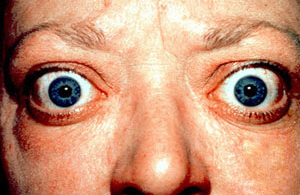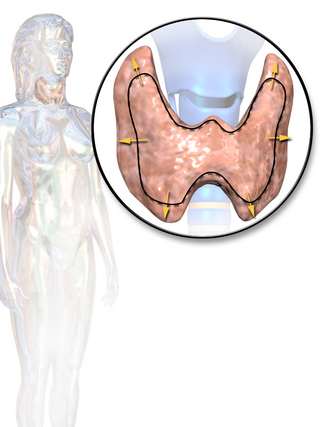Related Research Articles

Hyperthyroidism is the condition that occurs due to excessive production of thyroid hormones by the thyroid gland. Thyrotoxicosis is the condition that occurs due to excessive thyroid hormone of any cause and therefore includes hyperthyroidism. Some, however, use the terms interchangeably. Signs and symptoms vary between people and may include irritability, muscle weakness, sleeping problems, a fast heartbeat, heat intolerance, diarrhea, enlargement of the thyroid, hand tremor, and weight loss. Symptoms are typically less severe in the elderly and during pregnancy. An uncommon but life-threatening complication is thyroid storm in which an event such as an infection results in worsening symptoms such as confusion and a high temperature; this often results in death. The opposite is hypothyroidism, when the thyroid gland does not make enough thyroid hormone.

The thyroid, or thyroid gland, is an endocrine gland in vertebrates. In humans, it is a butterfly-shaped gland located in the neck below the Adam's apple. It consists of two connected lobes. The lower two thirds of the lobes are connected by a thin band of tissue called the isthmus. Microscopically, the functional unit of the thyroid gland is the spherical thyroid follicle, lined with follicular cells (thyrocytes), and occasional parafollicular cells that surround a lumen containing colloid.

Graves' disease, also known as toxic diffuse goiter or Basedow’s disease, is an autoimmune disease that affects the thyroid. It frequently results in and is the most common cause of hyperthyroidism. It also often results in an enlarged thyroid. Signs and symptoms of hyperthyroidism may include irritability, muscle weakness, sleeping problems, a fast heartbeat, poor tolerance of heat, diarrhea and unintentional weight loss. Other symptoms may include thickening of the skin on the shins, known as pretibial myxedema, and eye bulging, a condition caused by Graves' ophthalmopathy. About 25 to 30% of people with the condition develop eye problems.

Hypothyroidism is a disorder of the endocrine system in which the thyroid gland does not produce enough thyroid hormones. It can cause a number of symptoms, such as poor ability to tolerate cold, extreme fatigue, muscle aches, constipation, slow heart rate, depression, and weight gain. Occasionally there may be swelling of the front part of the neck due to goitre. Untreated cases of hypothyroidism during pregnancy can lead to delays in growth and intellectual development in the baby or congenital iodine deficiency syndrome.
Thyroid-stimulating hormone (also known as thyrotropin, thyrotropic hormone, or abbreviated TSH) is a pituitary hormone that stimulates the thyroid gland to produce thyroxine (T4), and then triiodothyronine (T3) which stimulates the metabolism of almost every tissue in the body. It is a glycoprotein hormone produced by thyrotrope cells in the anterior pituitary gland, which regulates the endocrine function of the thyroid.

Triiodothyronine, also known as T3, is a thyroid hormone. It affects almost every physiological process in the body, including growth and development, metabolism, body temperature, and heart rate.

Hashimoto's thyroiditis, also known as chronic lymphocytic thyroiditis, Hashimoto's disease, and autoimmune thyroiditis is an autoimmune disease in which the thyroid gland is gradually destroyed.

Thyroid disease is a medical condition that affects the function of the thyroid gland. The thyroid gland is located at the front of the neck and produces thyroid hormones that travel through the blood to help regulate many other organs, meaning that it is an endocrine organ. These hormones normally act in the body to regulate energy use, infant development, and childhood development.

Thyroiditis is the inflammation of the thyroid gland. The thyroid gland is located on the front of the neck below the laryngeal prominence, and makes hormones that control metabolism.

De Quervain's thyroiditis, also known as subacute granulomatous thyroiditis or giant cell thyroiditis, is a self-limiting inflammatory illness of the thyroid gland. De Quervain thyroiditis is characterized by fever, flu-like symptoms, a painful goiter, and neck pain. The disease has a natural history of four phases: thyroid pain, thyrotoxicosis, euthyroid phase, hypothyroid phase, and recovery euthyroid phase.
Thyroid function tests (TFTs) is a collective term for blood tests used to check the function of the thyroid. TFTs may be requested if a patient is thought to suffer from hyperthyroidism or hypothyroidism, or to monitor the effectiveness of either thyroid-suppression or hormone replacement therapy. It is also requested routinely in conditions linked to thyroid disease, such as atrial fibrillation and anxiety disorder.

The hypothalamic–pituitary–thyroid axis is part of the neuroendocrine system responsible for the regulation of metabolism and also responds to stress.
An antithyroid agent is a hormone inhibitor acting upon thyroid hormones.

Thyroid hormones are any hormones produced and released by the thyroid gland, namely triiodothyronine (T3) and thyroxine (T4). They are tyrosine-based hormones that are primarily responsible for regulation of metabolism. T3 and T4 are partially composed of iodine, derived from food. A deficiency of iodine leads to decreased production of T3 and T4, enlarges the thyroid tissue and will cause the disease known as simple goitre.

Familial dysalbuminemic hyperthyroxinemia (FDH) rare genetic condition that is a common cause of euthyroid hyperthyroxinemia and is associated with mutations in the human serum albumin gene. It is an autosomal dominant condition that is often mistaken for resistance to thyroid hormone (RTH) syndromes or hyperthyroidism. FDH is characterized by high levels of thyroxine (T4) and normal levels of thyroid stimulating hormone (TSH). Due to the mutations in the albumin gene, an abnormal albumin protein binds thyroid hormones with a high affinity than normal. This explains why those with familial dysalbuminemic hyperthyroxinemia have increased T4 levels and normal TSH levels.

Thyrotoxic periodic paralysis (TPP) is a rare condition featuring attacks of muscle weakness in the presence of hyperthyroidism. Hypokalemia is usually present during attacks. The condition may be life-threatening if weakness of the breathing muscles leads to respiratory failure, or if the low potassium levels lead to abnormal heart rhythms. If untreated, it is typically recurrent in nature.
Thyroid disease in pregnancy can affect the health of the mother as well as the child before and after delivery. Thyroid disorders are prevalent in women of child-bearing age and for this reason commonly present as a pre-existing disease in pregnancy, or after childbirth. Uncorrected thyroid dysfunction in pregnancy has adverse effects on fetal and maternal well-being. The deleterious effects of thyroid dysfunction can also extend beyond pregnancy and delivery to affect neurointellectual development in the early life of the child. Due to an increase in thyroxine binding globulin, an increase in placental type 3 deioidinase and the placental transfer of maternal thyroxine to the fetus, the demand for thyroid hormones is increased during pregnancy. The necessary increase in thyroid hormone production is facilitated by high human chorionic gonadotropin (hCG) concentrations, which bind the TSH receptor and stimulate the maternal thyroid to increase maternal thyroid hormone concentrations by roughly 50%. If the necessary increase in thyroid function cannot be met, this may cause a previously unnoticed (mild) thyroid disorder to worsen and become evident as gestational thyroid disease. Currently, there is not enough evidence to suggest that screening for thyroid dysfunction is beneficial, especially since treatment thyroid hormone supplementation may come with a risk of overtreatment. After women give birth, about 5% develop postpartum thyroiditis which can occur up to nine months afterwards. This is characterized by a short period of hyperthyroidism followed by a period of hypothyroidism; 20–40% remain permanently hypothyroid.
Antithyroid autoantibodies (or simply antithyroid antibodies) are autoantibodies targeted against one or more components on the thyroid. The most clinically relevant anti-thyroid autoantibodies are anti-thyroid peroxidase antibodies (anti-TPO antibodies, TPOAb), thyrotropin receptor antibodies (TRAb) and thyroglobulin antibodies (TgAb). TRAb's are subdivided into activating, blocking and neutral antibodies, depending on their effect on the TSH receptor. Anti-sodium/iodide (Anti–Na+/I−) symporter antibodies are a more recent discovery and their clinical relevance is still unknown. Graves' disease and Hashimoto's thyroiditis are commonly associated with the presence of anti-thyroid autoantibodies. Although there is overlap, anti-TPO antibodies are most commonly associated with Hashimoto's thyroiditis and activating TRAb's are most commonly associated with Graves' disease. Thyroid microsomal antibodies were a group of anti-thyroid antibodies; they were renamed after the identification of their target antigen (TPO).
Roger Ekins FRS was a British biophysicist and professor at University College London. He was awarded the 1998 Edwin F. Ullman Award.

Hypothyroidism is an endocrine disorder in which the thyroid gland fails to produce sufficient thyroid hormones. Hypothyroidism is one of the most common endocrinopathies in dogs. It is either acquired or congenital.
References
- ↑ Mathioudakis N., Cooper D.S. (2015) Exogenous Thyrotoxicosis. In: Davies T. (eds) A Case-Based Guide to Clinical Endocrinology. Springer, New York, NY
- ↑ Lucie Wartique, Lucie Pothen, Nathalie Pirson, Michel P. Hermans, Michel Lambert & Halil Yildiz (2017) An unusual cause of epidemic thyrotoxicosis. In: Acta Clinica Belgica, 72:6, 451–453, DOI: 10.1080/17843286.2017.1309336
- ↑ "Hamburger Thyrotoxicosis". www.vivo.colostate.edu.
- ↑ Vaidya, B; Pearce, S. H. S (2014). "Diagnosis and management of thyrotoxicosis". BMJ. 349: g5128. doi:10.1136/bmj.g5128. PMC 1476727 . PMID 25146390.
- ↑ Pearce EN: Diagnosis and management of thyrotoxicosis. In: BMJ. 2006 Jun 10; 332(7554): 1369–1373.
- ↑ Geraldo Medeiros-Neto: Thyroxine Poisoning. in: Endotext, Created: July 17, 2018.
- ↑ Kang GY et al.: Thyroxine and triiodothyronine content in commercially available thyroid health supplements. In: Thyroid. 2013 Oct; 23(10): 1233-1237.
- ↑ Jahagirdar, V R; Strouhal, P; Holder, G; Gama, R; Singh, B M (2008). "Thyrotoxicosis factitia masquerading as recurrent Graves' disease: Endogenous antibody immunoassay interference, a pitfall for the unwary". Annals of Clinical Biochemistry. 45 (3): 325–327. doi: 10.1258/acb.2007.007163 . PMID 18482926. S2CID 34751194.